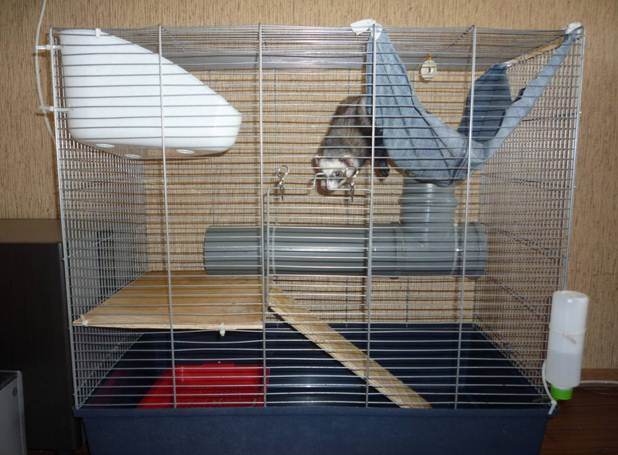Content
Ferrets do not live as long at home as other pets (cats, dogs). This is due to the fact that their habits and diseases are not so well studied. Find out more about how to prolong the life of your pet using the information in the article below.
How long do domestic ferrets live?
The average lifespan of a ferret at home is 7 to 9 years. This period can fluctuate both up and down. Under the right conditions, ferrets live up to 12 years, and if the requirements are not met, the animals die at a young age (up to 5 years).
What affects the lifespan of ferrets
There are several factors that influence the lifespan of domestic ferrets:
- heredity. Bad genes are passed on from parents. If a ferret's parents died of natural causes at a young age, the offspring will most likely show the same life expectancy. Experienced breeders use genetically healthy individuals for mating, so the life expectancy of polecats purchased in special nurseries is much higher than that of pets purchased from unknown sellers;
- Sterilization (castration) allows you to prolong the life of a ferret and protect it from cancer. The physical condition of ferrets is very dependent on the presence of a partner and the satisfaction of sexual instincts. Without mating, unsterilized ferrets die at a young age. In addition, their behavior changes significantly after puberty. If there is no female during the rutting period, the male may even run away from his owners in search of a mate;
- poor nutrition shortens lifespan. Many owners do not close the kitchen and allow their pet to feast on delicacies from the owner’s table. This causes the ferret to develop stomach problems. Exacerbation of diseases contributes to a shorter life of a ferret at home;
- Vaccinations against rabies and canine distemper will extend the life of a ferret at home. One should not naively believe that if a pet does not go outside, then these dangerous diseases will be spared. According to statistics, 60% of cases of plague are detected in unvaccinated pets; in 10% of cases of rabies, pets had no contact with street animals.
How can you determine the age of a pet ferret?
When buying a ferret, many people want to know the exact age, and sellers are sometimes disingenuous and sell adult animals instead of young ones, which means that the life expectancy of a domestic ferret will be much shorter than if a baby were purchased.
There are several options for determining the age of a domestic ferret:
- by color and wool structure. In young individuals up to 1.5 months, the fur is still childish - gray in color. At the age of 2-3 months, color appears. The fur of young animals is very soft and pleasant to the touch, while in adult pets it is hard.In older animals, the fur becomes sparse and thin, and bald patches most often appear on the tail;
- according to the condition of the teeth. Molars erupt at the age of 1.5 months; up to this point the baby has milk teeth. By the age of three months, the ferret develops sharp fangs. Until one year of age, the fangs are white and sharp. At the age of 1.5 to 2.5 years, the edge of the fangs becomes dull, yellowness and some transparency appear. Between 3-4 years of age, transparency affects most of the canines, and by 5-6 years of age the teeth become very yellow, and you may notice the absence of some small teeth located in the lower jaw. The tightness of the fangs indicates that the ferret is no longer young, even if the seller claims the opposite;
- behavior can also give away old animals. Young pets are active, curious, and playful, while adults play rarely, behave more sedately, and sleep more.
How to increase the lifespan of a ferret
Ferrets live at home for about 10 years, but it all depends on what conditions the owners create for them. Not only comfort and coziness can increase the lifespan of a pet; there are some factors that help extend the lifespan of a ferret in captivity.
Ferrets are active and freedom-loving, so they perceive confinement in a cage very poorly. Constantly being in a confined space leads to the fact that the animal’s life becomes joyless and uninteresting. Such ferrets quickly wither and die at an early age.
When keeping a ferret, a cage is necessary in several cases:
- during repair work;
- when visiting a veterinary clinic;
- for temporary isolation of an animal.
The better equipped the cage, the more comfortable it is for the pet, and therefore, the life expectancy increases. Additional equipment required for the cage:
- drinking bowl;
- feeder;
- tray;
- hammock;
- shelves for rest;
- stairs;
- equipment for games.
Sterilization
Ferrets reach puberty at an early age. Already at 6-8 months, the animal’s character changes, marks appear on the carpets and an unpleasant smell in the apartment.
During the rut, the ferret urgently needs a mate. However, mating alone is not enough. In order for the pet to calm down a little, he will need at least 4-5 sexual intercourses. And if a pair is not found, the ferret's health deteriorates. Unsatisfied sexual instincts lead to a sharp reduction in life expectancy, and the ferret dies at a young age.
Castration is the best solution if the ferret lives without a mate and finding a bride is problematic. Sterilized animals improve their character, they become good-natured, more docile, playful, they stop marking their territory, and the unpleasant odor disappears.
People who have ferrets at home confirm that sterilization can increase the life expectancy of a pet and improve coexistence with it in the same room.
Vaccination
Infectious diseases in ferrets that require vaccination:
- rabies;
- leptospirosis;
- carnivore plague.
Veterinarians recommend vaccinating ferrets no matter how they are kept.Even a pet that does not go outside for walks can become infected with dangerous diseases. The danger comes from the owner's clothing and shoes, as well as a visit to the veterinary clinic or a chance encounter with a wild mouse that has sneaked into the house. There are plenty of ways to become infected, so to increase the life expectancy of a ferret, it is advisable to get vaccinated.
Completely healthy pets are accepted for vaccination. An acquired ferret at two months of age is treated for worms, after which (after 10 days) vaccination can be carried out.
To reduce the likelihood of contracting dangerous diseases, contact with other pets and the outside world should be avoided before and during the vaccination period.
Vaccination is not carried out if the pet is sick. Also, pregnant and lactating women, as well as females during estrus, should not be vaccinated.
Feeding
Ferrets are carnivorous animals that require a meat diet. Some owners feed their ferrets incorrectly, believing that they are rodents. Plant foods are not suitable for feeding predators. Without meat in the diet, your pet can get sick and die prematurely.
The diet can be enriched with all kinds of herbal supplements (up to 15%), but most of the food should consist of meat ingredients.
Conclusion
Ferrets live quite comfortably at home if the owner, before purchasing the animal, has become familiar with the rules of its maintenance, care and feeding. Young males without mating die very quickly from disease, so the issue of sterilization must be resolved immediately after the pet reaches puberty.Proper nutrition and vaccination, as well as personal space in the apartment will help to extend the life of your pet at home. A small cage impedes the animal's mobility and shortens its lifespan.










